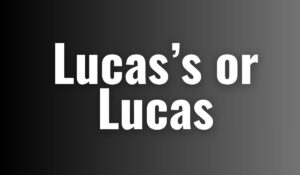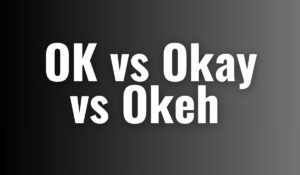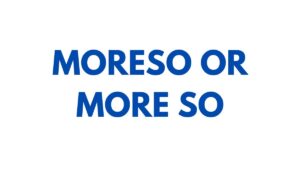Sundays or Sunday’s just one tiny apostrophe, yet it separates flawless grammar from a subtle mistake that can cost your writing its polish and credibility.
Imagine publishing a blog, business sign, or school paper with an apostrophe in the wrong place it might seem small, but to grammar enthusiasts, it screams unprofessional.
Whether you’re a writer, student, marketer, or English learner, understanding the difference between Sundays and Sunday’s isn’t just about rules it’s about writing with confidence, precision, and authority.
In this definitive guide, we’ll break down the grammar, share real-life examples, show common mistakes, and reveal expert tricks to help you never second-guess yourself again.
🧠 Quick Answer
| Word | Type | Meaning | Example |
| Sundays | Plural noun | More than one Sunday | “I relax on Sundays.” |
| Sunday’s | Singular possessive | Something belonging to Sunday | “Sunday’s weather was great.” |
| Sundays’ | Plural possessive | Belonging to multiple Sundays | “The Sundays’ sermons were inspiring.” |
✅ Rule of Thumb:
Use Sundays for plural (more than one day).
Use Sunday’s for possession (belonging to one Sunday).
📘 Understanding “Sunday” in English Grammar
Sunday is a proper noun the name of the day of the week. Like Monday, Tuesday, or Friday, it becomes plural with an -s (Sundays) and possessive with an ’s (Sunday’s).
Examples of Sunday as a Base Word
- One Sunday – singular form
- Two Sundays – plural form
- Sunday’s weather – possessive form
- Sundays’ schedule – plural possessive form
These forms are standard across English grammar, but the apostrophe’s position changes the meaning entirely.
Understanding Sundays or Sunday’s
The confusion between Sundays and Sunday’s comes down to a small apostrophe that changes meaning entirely. Both are correct in English grammar but they serve different functions. Sundays is the plural form of Sunday, meaning more than one Sunday. Sunday’s, however, is possessive, showing ownership or a relationship to that specific day.
Understanding this distinction is crucial for writing clarity. Whether you’re crafting social posts, articles, or signage, using the correct form builds professionalism and credibility. The difference may seem small, but to readers, it reflects your mastery of English grammar and apostrophe usage.
Sundays: Definition and Usage
The word Sundays is the plural noun form of Sunday, used when referring to multiple Sundays or regular events that happen on that day. You use “Sundays” when describing habits, schedules, or activities repeated weekly. For example: “I go to yoga on Sundays,” or “We visit our grandparents two Sundays a month.”
It never takes an apostrophe, because it doesn’t show possession. Think of “Sundays” as part of patterns and routines. In writing, this form appears often in time expressions like every Sunday or on Sundays throughout the year, emphasizing repetition and frequency.
10 Synonyms for Sundays
While Sundays doesn’t have direct synonyms (since it’s a specific day), several related expressions can replace or describe it contextually. Here are ten you can use depending on tone or intent:
- The weekend
- The Lord’s Day
- Rest day
- Day of worship
- Holiday
- Day of rest
- Church day
- Sabbath
- Weekend morning
- Sunday mornings
These variations help diversify writing while maintaining meaning. For example, “We meet every rest day” or “Our family gathers every weekend.” Use these alternatives to make your writing more natural and engaging without overusing “Sundays.”
Sunday’s: Definition and Usage
Sunday’s is the possessive form of Sunday, used to show ownership or something belonging to Sunday. For instance, “Sunday’s weather was sunny” means the weather belonged to Sunday. It can also act as a contraction for Sunday is or Sunday has e.g., “Sunday’s going to be busy.”
In both cases, the apostrophe before the “s” signals either possession or contraction. Writers often misuse it when trying to make a plural, but remember: apostrophes never make words plural they show ownership or connect shortened forms. Always ensure the apostrophe is justified by context.
10 Synonyms for Sunday’s
The term Sunday’s doesn’t have exact synonyms, but depending on context, you can use descriptive substitutes or rephrased forms to express ownership or relation. Here are ten creative alternatives:
- Of Sunday
- On Sunday
- During Sunday
- This Sunday’s
- Sunday-related
- Belonging to Sunday
- Sunday-specific
- At Sunday’s time
- Pertaining to Sunday
- Sunday occasion
Example: Instead of “Sunday’s schedule,” you could write “the schedule for Sunday.” These alternatives make your language more flexible and professional while keeping your meaning clear and grammatically precise.
What Does “Sunday” Mean?
The word Sunday originates from the Old English Sunnandæg, meaning “day of the sun.” It’s recognized globally as either the first or last day of the week, depending on cultural calendars. Traditionally, Sunday represents rest, worship, and renewal. In modern use, it’s also symbolic of leisure, family, and preparation for the coming week.
Grammatically, “Sunday” is a proper noun, always capitalized. It functions as both a subject and modifier, as in “Sunday morning” or “Sunday dinner.” Knowing its origin and role helps you understand how to properly form plurals and possessives like Sundays and Sunday’s.
Singular Possessive: “Sunday’s”
The singular possessive form Sunday’s indicates ownership or connection to one specific Sunday. For example, “Sunday’s newspaper” means “the newspaper that belongs to Sunday.” It shows that one item, idea, or event is directly tied to that day.
Grammatically, you create this by adding an apostrophe + s to the word Sunday. In contractions, Sunday’s can also mean Sunday is or Sunday has e.g., “Sunday’s been calm.” Always check whether the word expresses ownership or a shortened phrase. In both cases, it’s tied to one particular Sunday, not multiple Sundays.
How to Form the Singular Possessive
To form a singular possessive noun, add ’s to the end of a singular word even if it already ends in “s.” In this case, Sunday becomes Sunday’s. Example: “Sunday’s events were well organized.”
This small punctuation mark shows ownership, linking the noun to what belongs to it. The rule applies to most singular nouns e.g., dog’s bone, teacher’s book, or child’s toy. Remember, never use an apostrophe for plurals. So while “Sundays” refers to more than one day, “Sunday’s” identifies something belonging to that specific day.
Side by Side Comparison
Here’s a quick comparison to clearly distinguish the three forms:
| Form | Type | Meaning | Example |
| Sunday | Singular noun | One day of the week | “Sunday is my favorite day.” |
| Sundays | Plural noun | More than one Sunday | “I relax on Sundays.” |
| Sunday’s | Singular possessive | Belonging to Sunday | “Sunday’s meeting was long.” |
Understanding these forms improves your writing accuracy and readability. The distinction may seem small, but it separates average writing from professional-level communication. When unsure, rephrase the sentence — if ownership fits, use Sunday’s; if repetition fits, use Sundays.
Practice Makes Perfect
The best way to master Sundays vs Sunday’s is through consistent practice. Write short sentences using both forms correctly. For example:
- “Sunday’s sky was clear.”
- “We play football on Sundays.”
Reading and writing these regularly will train your eye to spot the difference instantly. You can also try replacing “Sunday’s” with “its” if the sentence makes sense, it’s possessive. If not, it’s likely plural. Over time, these patterns will become second nature, helping you write with confidence and grammatical precision.
Everyday Usage: 10 Examples
Here are ten examples showing how to use both forms naturally in sentences:
- Sunday’s weather was beautiful.
- We go to the park on Sundays.
- Sunday’s sermon inspired everyone.
- I usually relax on Sundays.
- Sunday’s paper had great news.
- Sundays are my favorite days to rest.
- I plan my week every Sunday’s evening.
- We have lunch together on Sundays.
- Sunday’s football match was exciting.
- Sundays bring peace and quiet.
These examples illustrate proper usage in both casual and formal contexts, reinforcing correct grammar habits.
Why Is This Important?
Knowing the difference between Sundays and Sunday’s matters more than you might think. It impacts how readers perceive your professionalism, attention to detail, and language accuracy. In business writing, education, and content marketing, grammatical precision builds trust and authority.
Misusing an apostrophe can distract readers and weaken your credibility. Understanding when to pluralize and when to show possession ensures your writing communicates exactly what you intend. It’s a small rule with a big impact a mark of mastery that separates confident writers from careless ones.
Tip to Remember the Difference
Here’s a simple memory trick:
If it’s more than one, add “s.” If it owns something, add “’s.”
So:
- “I rest on Sundays” → plural.
- “Sunday’s schedule is full” → possessive.
You can also replace Sunday’s with it’s or its to check:
- “Its schedule is full” ✅ (possessive).
- “They rest on them” ✅ (plural).
These mental checks make it easy to decide which form fits. With enough practice, recognizing when to use Sundays or Sunday’s will become automatic.
Conclusion
Understanding the difference between Sundays and Sunday’s is a small yet powerful step toward mastering English grammar. While Sundays refers to more than one Sunday, Sunday’s shows possession or contraction each serving a unique grammatical purpose. Using them correctly demonstrates professionalism, accuracy, and attention to detail in your writing.
Whether you’re crafting blog posts, emails, or academic work, precise grammar enhances clarity and credibility. Remember: no apostrophe for plurals, apostrophe for possession. With consistent practice and awareness, you’ll avoid common mistakes and write confidently every time. So next time you see “Sundays” or “Sunday’s,” you’ll know exactly which one belongs and why it matters.
FAQS ABOUT Sundays and Sunday’s
What is the difference between Sundays and Sunday’s?
The difference between Sundays and Sunday’s lies in grammar and meaning. Sundays is plural, referring to more than one Sunday for example, “We go hiking on Sundays.” Sunday’s is possessive, showing ownership or contraction, like “Sunday’s weather was perfect.” The apostrophe in Sunday’s signals possession or a shortened phrase.
When should I use Sundays instead of Sunday’s?
Use Sundays when you’re talking about more than one Sunday or something that happens regularly, such as “We meet every Sunday.” It doesn’t take an apostrophe because it’s a plural noun, not a possessive. This form is ideal for schedules, weekly routines, or recurring events.
When do I use Sunday’s correctly in a sentence?
You use Sunday’s when showing possession or forming a contraction. For example, “Sunday’s football match was exciting” (possessive) or “Sunday’s going to be busy” (short for Sunday is). Always include the apostrophe to show ownership or contraction — not to make plurals.
Is it correct to write ‘Open on Sunday’s’?
No, “Open on Sunday’s” is incorrect because the business isn’t owned by Sunday. The correct form is “Open on Sundays.” The apostrophe should never be used for plurals. Remember: add “s” for plural (more than one) and ’s for possession (something belongs to Sunday).
What is the plural possessive form of Sunday?
The plural possessive of Sunday is Sundays’ with the apostrophe placed after the s. It shows ownership by multiple Sundays. Example: “The Sundays’ events were all successful.” However, this form is rarely used in everyday writing, since plural possessives of days are uncommon in modern English.








